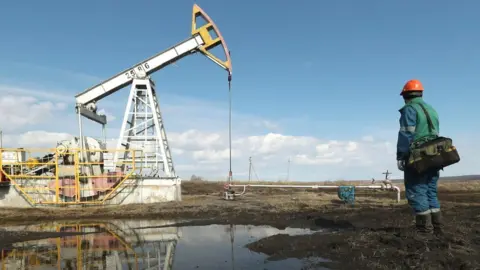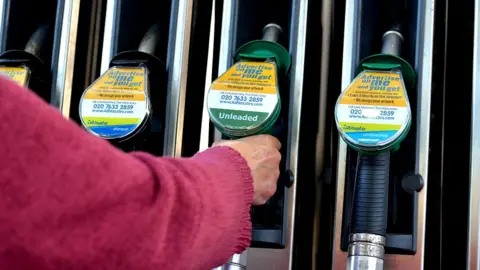Coronavirus: Oil plunges for a second day on gloomy outlook
 TASS / Getty Images
TASS / Getty ImagesThe UK benchmark for oil has slumped 10% to around $16 (£13) a barrel in another day of declines.
It comes after the price of West Texas Intermediate (WTI), the benchmark for US oil, fell below zero for the first time ever earlier this week.
The falls are a striking illustration of just how much economic activity has slowed around the world.
Prices have weakened sharply because of a combination of events triggered by a collapse in global demand.
The knock-on effect has been a supply glut and a worldwide shortage of storage space for oil.
On Tuesday energy ministers from the Opec and other major oil-producing countries held an unscheduled conference call to discuss the collapse but did not agree any new measures to cut supplies.
Storage issues
"This is an unprecedented demand drop. Nobody in their lifetime has seen anything like this," said Peter McNally of Third Bridge Group.
The collapse in physical demand for crude products like petrol and jet fuel has left storage hubs at capacity or, as one trader put it: "They're close to the brim."
Storage at US oil hub Cushing has already grown to more than 15 million barrels in the past month - and is expected to soon be at capacity for the first time ever.
"Coronavirus is rewriting the rules of the global economy in front of our very eyes," said Adam Vettese, analyst at eToro.
"With oil demand virtually non-existent, this quite amazing sell-off is almost entirely down to fears over storage."
 Getty Images
Getty ImagesWill the price of petrol fall?
While the price of petrol is linked to the wholesale price of oil, it is driven by competition.
That means that what motorists pay is not directly linked to crude. Instead, suppliers control the prices they sell petrol at.
Crucially, a key factor affecting the price of fuel is that the biggest proportion of the money you hand over for a litre of petrol in the UK goes to the government in the form of tax.
Fuel duty is charged at 57.95p per litre. On top of that, you have to pay VAT at 20% on the cost of petrol.
Below £1 a litre?
Could this week's oil price turmoil see prices drift below £1 for the first time since the late 2000s?
"In theory, petrol prices could fall below £1 per litre if the lower wholesale costs were reflected at the pumps - but at the same time, people are driving very few miles, so they're selling vastly lower quantities of petrol and diesel at the moment," pointed out RAC fuel spokesman Simon Williams.
This means many forecourts will be reluctant to trim their prices any further, he said.
At the same time, he said, more price pressure on petrol could hit the viability of independent garages, which provided "a vital service in areas where the supermarkets don't have a foothold".
"It would be bad news all round if these forecourts shut up shop for good."
Are pump prices fair?
Since the end of March, the wholesale price of petrol has been around the 16p a litre mark, according to the AA.
"Add fuel duty at 57.95p a litre, a generous 9p a litre supplier/retailer margin, plus VAT and the average pump price of petrol would normally be around £1 a litre," said the AA's fuel spokesperson Luke Bosdet.
Instead, the average pump price is higher because the retailers say they need to charge 10p a litre more to offset the lower volumes of fuel they are selling, he pointed out.
Journey levels are at about 40% of normal during the working week, falling to 20% by Sunday.
This meant those who were still driving were being "overcharged on average by more than a fiver a tank".
"I suspect that when the lockdown comes to an end, coronavirus is beaten and driving starts to return to normal, questions will be asked about the fairness of pump prices during the great oil crash of 2020."
